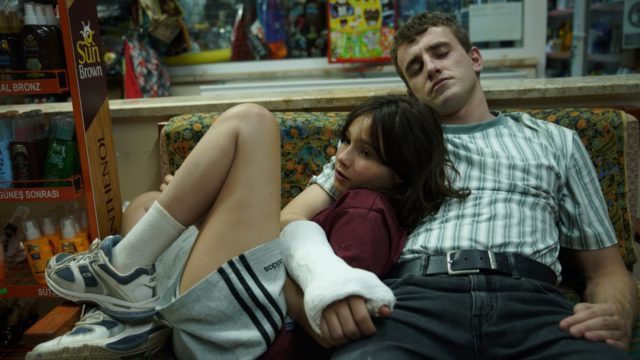
A father (Paul Mescal) and daughter (Francesca Corio) bond in Charlotte Wells’s Aftersun
AFTERSUN (Charlotte Wells, 2022)
New York Film Festival, Film at Lincoln Center
Saturday, October 8, Alice Tully Hall, 12:00
Sunday, October 9, Alice Tully Hall, 9:00
Monday, October 10, BAM Cinemas, 7:00
212-355-6160
www.filmlinc.org
At one point in Charlotte Wells’s hauntingly beautifully debut feature, Aftersun, a divorced father, Calum (Paul Mescal), and his eleven-year-old daughter, Sophie (Francesca Corio), are standing in the mountains, arms stretched to the sky as if the world is limitless for them, but nearby is an old, rotting sign that announces, “We know the perfect place,” once upon a time offering visitors “paradise.” The two are on vacation on the Mediterranean coast of Turkey, a bonding trip during which Calum assures Sophie, “You can live wherever you want to live. Be whoever you want to be.”
It is apparent that Calum and Sophie have not spent a lot of time together of late, as Calum has left their home country of Scotland following the divorce. In Turkey, they experience a warm and loving bond, as Calum learns how to be a father again and Sophie begins her transition into adolescence, neither one knowing exactly what comes next. Calum is watching his daughter grow up right in front of him, and he doesn’t always know quite how to react; as Sophie hangs out with a group of older teens as well as a boy her own age who has a crush on her, Calum allows her a freedom that threatens to be too much, sometimes acting more like a big brother or friend than a father. But as we discover, Sophie is an extraordinary capable young girl, coming of age in a world that is not a paradise for everyone.
Aftersun is a captivating adventure in which Scottish NYU grad Wells plays with genre tropes, gently turning them inside out as she makes the audience reevaluate their expectations from both real life and fictional drama. Many of the scenes are set up in a way that you anticipate a certain outcome — usually a dangerous one — but the bad result never happens, and we are disappointed in ourselves for having imagined a different conclusion.
The film is very much an extension of Wells’s early shorts, Blue Christmas, Laps, and Tuesday, in which she deals with such subjects as sexual abuse, the loss of a parent, and mental illness that threatens to tear a family apart. Wells favors a realistic pace, moving at the speed of life, with an expert sense of composition and a knack for avoiding unnecessary dialogue or explication while often using a handheld camera to keep things slightly off balance. We also get to see brief hints of Sophie as an adult (Celia Rowlson-Hall), thinking back on this critically formative vacation.
In Aftersun, Wells and cinematographer Gregory Oke incorporate pixelated digital shots and occasional grainy textures amid gorgeous images of the Turkish coast, lovingly edited by Blair McClendon and accompanied by a wistful score by Oliver Coates. The Irish Mescal (Normal People, The Lost Daughter) fully embodies the role of a father trying to redefine what’s important to him, while Corio, in her first film, having been chosen from a casting call of more than eight hundred actresses, is charming and delightful as Sophie; her eyes light up the screen with their sense of wonder at what awaits her, and us.
Aftersun is screening October 8-10 at the New York Film Festival with Wells participating in Q&As after the noon screening on October 8 (joined by Corio) and the October 9 show at 9:00; Wells will also take part in a free talk with Mia Hansen-Løve (One Fine Morning) on October 8 at 4:00 at the Elinor Bunin Munroe Film Center amphitheater. The film opens at Lincoln Center on October 21.